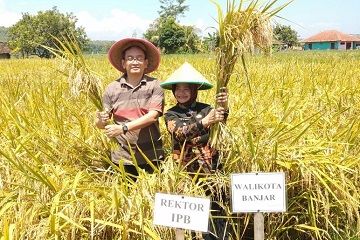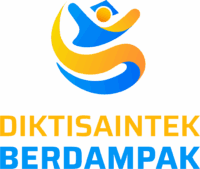LPPM IPB Holds 3S Rice First Harvest in Banjar City

Institute of Research and Community Service (LPPM) of IPB University (IPB), in partnership with Body of Community Empowerment of Banjar City, conducted the first harvest of IPB 3S rice plot, located in Mekarharja Village, Purwaharja District, Banjar City, West Java, Friday (22/3).
IPB Team, led by the Head of LPPM IPB, Dr. Aji Hermawan, and the breeder of IPB-variety rice, Dr. Hajrial Aswidinoor alongside the Mayor of Banjar, Hj. Ade Uu Sukaesih, S.IP, M.Si conducted this event on a plot sized 1 hectare. This activity was accompanied by the facilitator of Creative Agriculture Field Station (SLAK) LPPM IPB from planting until harvesting processes.
The Mayor of Banjar in his greetings told that this activity could be the first step to prosper the people in Banjar. “I hope the planting of IPB 3S rice can increase the speed and quantity of grain and rice production,” she said.
Moreover, Ade said, “We hope Banjar can be one of the areas that breed IPB 3S rice and can proliferate it to villages outside Banjar City. Not only that, Banjar people also can plant indigofera seeds to solve animal feed issues and to increase animal productivity, so there will no longer be cases of emaciated cattle or dying sheep because of hunger.”
Dr. Hajrial explained that IPB 3S rice is a variety which is intended for irrigation fields. “One of the characteristics of this variety is that the amount of rice grain in one panicle reaches 350. With that amount of grain, the yield could potentially reach 8-13 tonnes per hectare. The planting of IPB 3S rice is done by mechanization because the rice is specifically designed to be resilient against falling out,” said Dr. Hajrizal when he explained about IPB 3S rice, which is the result of his study.
The Head of LPPM IPB, Dr. Aji Hermawan said that LPPM IPB since 2018 has established partnership with Banjar City by deploying SLAK facilitators for animal husbandry and agriculture development, especially in Mekarharja Village. In animal husbandry, one of the problems faced by the locals are the lack of greens when dry season arrives and ineffective waste management.
“Regarding that, in 2018 the facilitators of SLAK LPPM IPB has carried out SLAK activities which include training about making high-protein fermented feed (silage) for cattle, sheep, and goats using greens and legumes. The animal waste, meanwhile, can be used as composted fertilizer used for plot preparation for the rice,” he said.
The series of events was ended by the planting of indigofera, which has purpose to educate the locals about feed business development and its utilization to reduce erosion on riverbanks. (Ard)



